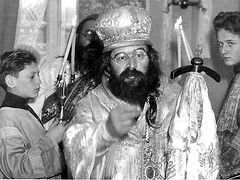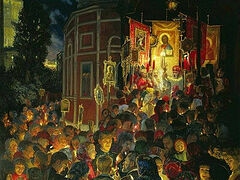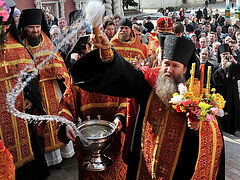Christ is Risen!
St. Ambrose of Milan, reflecting upon the feast of the Nativity of Christ, observes that from that point the day begins to lengthen, as if thereby showing the beginning and the abundance of spiritual light that shone upon the whole world from Bethlehem. It’s no less meet, brethren, for us to observe that the time of the Resurrection of Christ is that very time of year when all of nature is renewed and as if resurrected after the winter’s cold. Looking out at spring from the church windows, you can’t help but see in it a certain sign by which the earth annually welcomes the Conqueror of hell and death. The mournful signs on Golgotha occurred but once, for the Savior died but once. But the joyous signs of the Resurrection are ever repeated: For Christ, being raised from the dead dieth no more (Rom. 6:9). He could have died and resurrected at a different time of year, but He resurrected precisely when all of nature could greet Him with its own resurrection.
And who is more appropriate for it to greet with its great renewal? If there’s any order left in it after the fall of its king, Adam, if winter is always followed again by spring, then nature owes this remnant of life to none other than the Author of life, the Second Adam, Who, having decided to erase the traces of the first Adam’s fall, immediately after his fall took into His own hands that scepter of dominion that our pitiable forefather could no longer wield. Likewise, if after many short-term renewals through spring and summer, nature will someday see an enduring spring and be clothed in Edenic majesty, then all of this will happen as a result of nothing else but that the Lord sanctified the whole earth from the Cross with His Blood and communicated to all the elements the life-giving principle of renewal and immortality. Whom, therefore, should nature greet with its resurrection if not the Risen One Who, as the Church sings, “with [Himself] hast resurrected all?” (Magnification for Thomas Sunday). There’s a connection between the resurrection of nature and the Resurrection of the Lord—not only one of time, but of the deed itself. Nature is now resurrecting temporarily, because its Resurrector has now resurrected, and therefore it will one day resurrect eternally.
Brethren, this notion of the connection of spring to our celebrations increases both the joy of the feast and the pleasantness of spring. The Lord’s Resurrection becomes, if possible, even more magnificent for us when we imagine that its effect isn’t even limited to the whole human race, but extends to all of nature. And the spring of nature takes on a certain sacred form when we learn that this renewal of earth comes from the same principle as our spiritual renewal, that it is also the fruit of the atonement of Golgotha. After this, it’s clear what the Church means when it sings that “Heaven and earth, and the nethermost parts of the earth” rejoiced in the Resurrection of the Lord (Paschal Canon, Ode 3). The Lord’s Resurrection is a truly universal feast, for on Golgotha, as the Apostle puts it, the entire world was reconciled to God (2 Cor. 5:19). However, brethren, this universal peace will remain outside of us if we don’t bring it into our hearts! Everything around us will be renewed, but we will remain old if we don’t try to be new. Look at the face of nature: Spring is for the whole earth. Everything is blooming and adorning itself, while the withered trees are naked and ugly, spoiling the beauty of nature. Such are the souls of sinners: Like withered trees, they’ll remain dead while everything else is renewed. Inasmuch as everything was meant to be beautiful in Eden, then sinful souls will be treated as gardeners treat withered trees—that is, they’ll be cut down and thrown into the fire.
Therefore, brethren, it’s absolutely necessary to be renewed beforehand and, drinking the water of life and being warmed by the sun of grace, to begin to bear fruits of grace—we must resurrect here so as not to die an eternal death there!
Amen.




